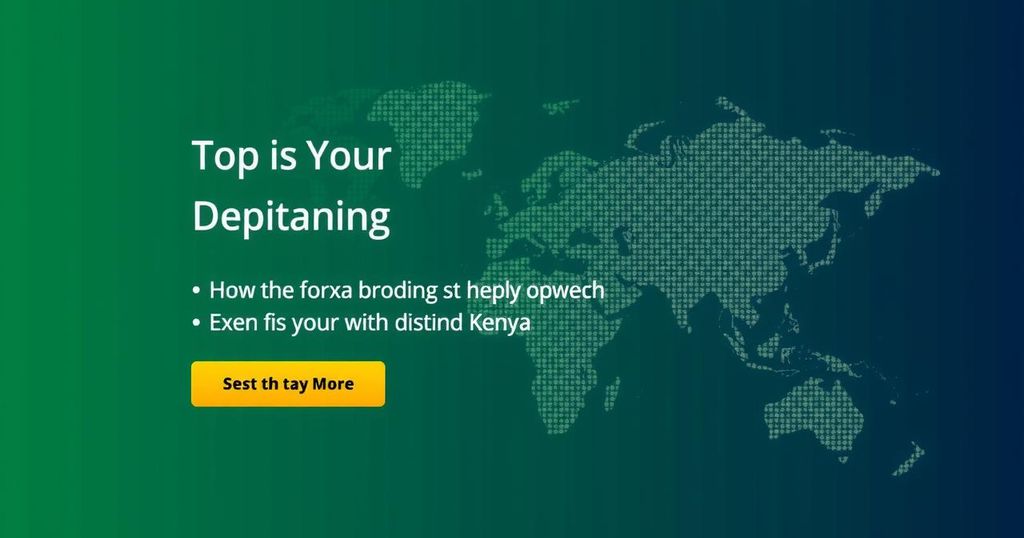The Essential Guide to Forex Trading in Kenya: Brokers, Taxes, and Starting Out

This article offers a comprehensive overview of forex trading in Kenya, highlighting its legal status and the importance of using CMA-licensed brokers for safe trading. It outlines key tax obligations for traders and provides guidance on how to start trading, emphasizing responsible practices and thorough research when selecting brokers.
Forex trading has emerged as a popular financial activity in Kenya, attracting a diverse group of traders from beginners to experienced investors. Navigating this market necessitates a clear understanding of its legal framework, choosing an appropriate broker, and being aware of tax obligations associated with trading activities. This article delves into these essential elements to facilitate informed participation in forex trading.
In Kenya, forex trading is sanctioned and regulated by the Central Bank of Kenya (CBK), whereas the Capital Markets Authority (CMA) oversees the operations of forex brokers. The CMA plays an integral role in safeguarding traders by enforcing strict regulations that brokers must adhere to, thereby mitigating the risks of fraud and malfeasance. It is highly recommended that traders utilize brokers licensed by the CMA to ensure compliance with regulatory standards and enhanced security for their investments.
When it comes to selecting an optimal forex broker in Kenya, several licensed options stand out:
1. EGM Securities (FXPesa) is licensed by the CMA and offers both MetaTrader 4 (MT4) and a proprietary trading platform, accommodating low minimum deposits and flexible leverage, making it ideal for novice and intermediate traders.
2. Scope Markets, also licensed by the CMA, provides advanced trading tools, competitive spreads, and a wealth of educational resources, catering to trades seeking professional-grade financial instruments.
3. Pepperstone, while not CMA-licensed, operates globally under respected regulators like the FCA and ASIC. It is favored by advanced traders due to its low spreads and rapid execution across multiple platforms such as MT4 and cTrader.
4. HotForex (HFM) maintains multiple international licenses but lacks CMA approval. It offers various account types, high leverage, and a diverse selection of tradable assets, appealing to those seeking flexible options.
When selecting a broker, factors such as regulatory compliance, trading platforms, fee structures, customer support, and educational resources must be thoroughly considered to ensure a satisfactory trading experience.
Moreover, forex traders in Kenya must recognize their tax responsibilities. Profits gained from forex trading are classified as part of an individual’s taxable income, which falls under the jurisdiction of the Kenya Revenue Authority (KRA). Tax rates on these trading profits range from 10% to 30%, depending on one’s income bracket. It is imperative that traders maintain meticulous records of their transactions and file annual tax returns with the KRA to avoid penalties associated with non-declaration of income.
To commence forex trading in Kenya, individuals should follow these essential steps: Firstly, gain a solid understanding of the forex market by utilizing online education resources such as webinars and demo accounts. Secondly, select a CMA-licensed broker to ensure security. Thirdly, register an account with the chosen broker, verifying personal identity and funding the account appropriately. Practicing with a demo account is encouraged to familiarize oneself with the trading platform before engaging in live trading. Finally, it is crucial to employ responsible risk management techniques, including stop-loss and take-profit orders.
In summary, forex trading in Kenya presents significant opportunities for growth and profitability when approached with diligence and wisdom. It is vital for traders to utilize brokers regulated by the CMA while ensuring adherence to tax obligations to mitigate potential legal issues. By making informed decisions regarding broker selection and trading strategies, traders can construct a rewarding experience in the forex market.
The popularity of forex trading in Kenya has surged in recent years, marked by the entry of both novice and experienced traders into the market. The legal framework surrounding forex trading is primarily governed by the Central Bank of Kenya and the Capital Markets Authority, which play pivotal roles in regulating this financial sector. The provision of high-quality brokers who comply with regulatory standards is necessary for securing the interests of traders. In addition, understanding tax obligations related to forex profits is crucial for compliance and financial planning. Therefore, possessing knowledge of the forex trading landscape in Kenya is essential for prospective traders.
In conclusion, venturing into forex trading in Kenya can yield lucrative outcomes if pursued with careful consideration. Utilizing a CMA-licensed broker is paramount for ensuring safety and compliance with legal standards. Furthermore, understanding tax obligations contributes to a seamless trading experience. By adhering to these best practices and implementing sound trading strategies, individuals can navigate the forex market successfully and enhance their financial portfolio.
Original Source: theafricalogistics.com








